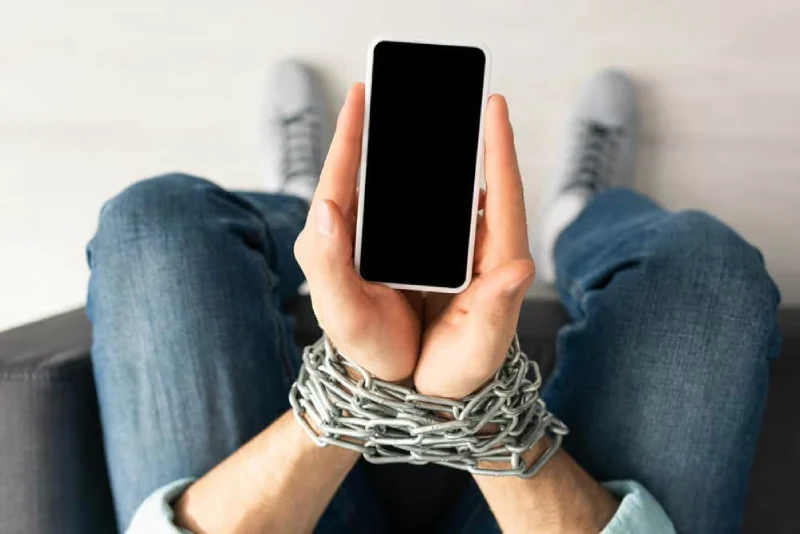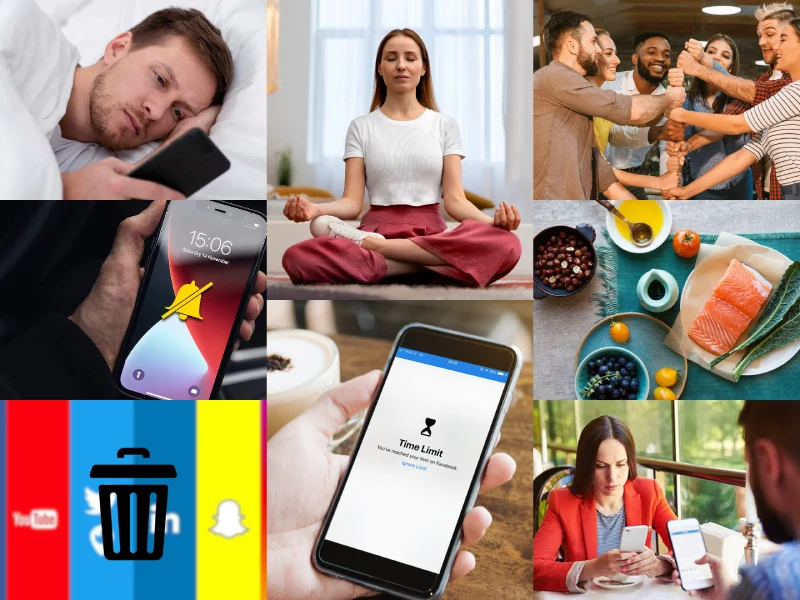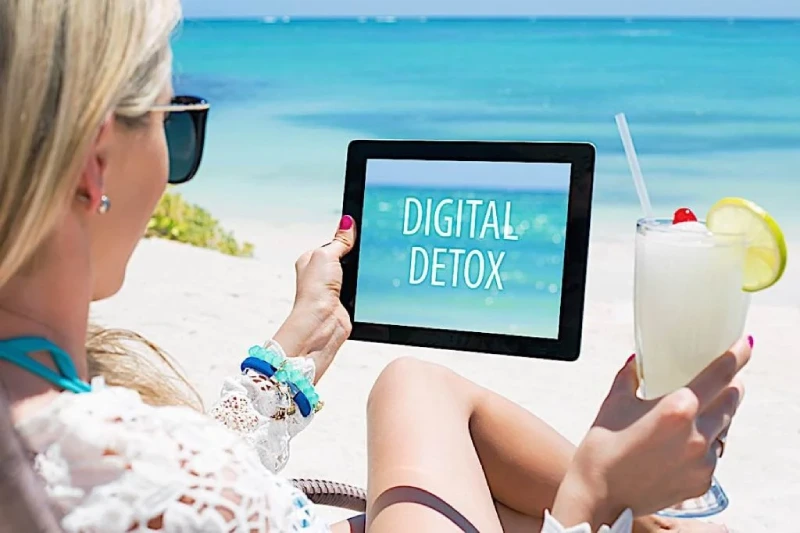In today’s modern era, humans are chronic users of technology. We are so engrossed in digital life that we have forgotten what life without our favorite gadgets looks like. We always find ourselves in front of the screens of our smartphones and laptops, chatting with our loved ones or scrolling through social media. The moment we hear our phone ping with the notification sound, we can’t help but check our mobile phones. The sheer curiosity and momentary bliss of entertainment have all of us in a chokehold.
Digitalization has brought a crucial revolution into our lives. The past few decades have seen an immense advancement in technology and how it has significantly impacted our lifestyle. It has proven to be very beneficial and has brought many positive changes, but overuse of the same has resulted in detrimental consequences. It has affected us in all aspects, viz, physically, psychologically, and socially. To counter the adverse effects of digitalization, it is crucial to distance yourself from the devices for the time being and reflect on your lifestyle, i.e., opting for a digital detox. We have created a simple guide on how to do a digital detox for you. But before discussing digital detox, we must first understand its need. Let’s understand how technology has negatively affected us and what measures we can take to counter those effects.
Adverse effects of overuse of technology on:

PHYSICAL HEALTH:
Excessive use of digital devices has proven hazardous to our health. With the increase in screen time, health conditions have worsened. Issues like eyestrain, headaches, poor posture, blurred vision, and hand, neck, and shoulder pain are observed in people with excessive screen time.
People, especially children addicted to smartphones, computers, and tablets, ignore their physical fitness and hence become victims of obesity and other health problems that come along with it, i.e., heart diseases, diabetes, high cholesterol, high blood pressure, fatty liver, breathing issues, etc.
An increase in screen time has also led to poor sleep quality and difficulty falling asleep.
MENTAL HEALTH
These online spaces and devices have deteriorated the mental health of people, especially of the current generation. People with excessive screen time are more prone to suffer from anxiety and depression.
As much as social media connects us, it also negatively impacts us by fostering the fear of missing out (FOMO), leading to feelings of loneliness, sadness, jealousy, and low self-esteem.
Another problem observed is a decrease in attention span. People with decreased attention spans cannot focus for longer, are easily distracted, impatient, and bored, and their ability to remember things is also affected.
It also fosters addiction, and people prefer spending their valuable time in front of screens and are unable to stay away from these devices. It causes anxiety, irritability, and aggression. Excessive screentime leads to the release of ‘dopamine,’ the happy hormone that causes addiction and compulsive behavior.
SOCIAL LIFE
Smart devices have isolated people from the outside world, limiting their creativity, social skills, and experience. Ironically, social media is made to connect people, yet it is creating more distance between them. People prefer texting online rather than meeting in person. Due to the overuse of devices, incompatibility and social anxiety arise. Everything from grocery shopping to dating people via dating apps and texting is done online; it has eradicated the need to communicate in person.
If you are facing any of the issues mentioned above or feel like you spend a lot of your time online, then it’s time to consider a digital detox. It is high time you reconnect with yourself and the real world.
What is digital detox, and why is it important?

Digital detox is a period when one decides to abstain from digital devices or reduces the amount of time spent online and tries to reconnect with oneself, people, and the real world. People go on a digital detox to reduce stress and overuse of these technological devices and regain focus and peace.
Digital detoxification lets you get back on track and realize how much of your valuable time is spent online. It allows you to explore other aspects of your life you might miss due to being busy. It also allows you to reconnect and strengthen bonds with your loved ones and enhance your social skills. It is the time when you reconnect with your true self. Focus more on your physical and mental health by practicing yoga, meditation, and exercises. You learn to maintain a balance between your online and offline life in a very constructive manner.
How to do a digital detox: your complete guide

1. Go slow and limit your screentime
You don’t need to disconnect from your online world in a complete single go. It is okay to start slow and make gradual progress in the process. You can start by reducing the amount of time you spend on these smart devices first. Schedule your day and dedicate a decent amount of time to being tech-free, especially one hour before and after sleeping. Resist yourself if you want to go online in those decided times of the day. Instead, make yourself busy with other offline activities.
2. Turn off your notifications.
We can’t help but instantly check whose text just popped up in the notification whenever we hear even a single ping. This is the major reason for your distraction. Hours wasted on smartphones start with checking a single notification. So, turn off the notifications of your social media apps. ‘No notification’ lessens your chances of checking your mobile phones, leading to endless scrolling on the apps.
3. Uninstall apps and temporarily deactivate your social media accounts
While on a digital detox, uninstall apps that keep you hooked to your devices for the longest time. Delete your social media apps and temporarily disable your accounts for a few days to avoid distraction and time wastage. Inform your friends, family, and colleagues to communicate with you via calls or SMS. Keep only strictly required apps on your mobile phones. It will help you maintain your digital detox.
4. Keep your mobile phones out of your sight.
When I say stay away from your smart devices, I mean keep them out of sight. Moreover, keep them in a different room, and don’t take them with you everywhere like usual. Try to avoid using them and thinking about them. Instead, think about better and more productive ways to engage yourself.
5. Avoid using mobile phones during a conversation.
While talking to anyone, give your full attention to the person and make your communication more effective. Paying attention and showing interest while communicating makes the person feel valued and builds a better understanding.
6. Meditate and gain control over yourself.
Meditation provides peace and helps you build more focus and concentration. It is a path to mindfulness. Meditation helps you gain self-control, which will help you have control over yourself and deal with addictions, including digital device addiction. Meditation also helps you develop self-awareness. Digital detox gives you a fantastic opportunity to work on yourself.
7. Engage in offline activities and learn new skills.
Make your online break more useful by exploring and developing new skills. For instance, you can do fun activities or explore nature for exciting adventures. You can go trekking, swimming, or even join a short course class to learn something new. You can even go on a short vacation and enjoy the time with your loved ones.
8. Create a healthy reschedule and maintain a balanced lifestyle.
The point of going on a digital detox is to need a change for the better. The change in the form of digital fasting is not temporary. It is done to regain control of our lives. Ending a digital detox does not mean going back to square one after a break. It means using this time to create a daily schedule that maintains a healthy balance between the virtual and real worlds.
Conclusion
Unplugging from the virtual world allows us to find and acquire control over ourselves instead of being controlled by technology. It is a must to remember that technology exists to make our lives more effective and more effortless and not otherwise. The problem arises when we start being addicted to it. When we find ourselves inseparable and intoxicated by the need to use the devices most of the time, we must realize it is time to distance ourselves from them. It kills our productivity and wastes our potential, affecting us adversely. Hence, we use a digital detox to fix our habits and lifestyle. We must maintain an addiction-free, healthy lifestyle, utilizing our time and potential in the right direction. We must limit the use of technology to guide ourselves on a path of life that leads us toward good physical and mental health.




